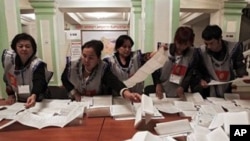Kyrgyzstan has conducted parliamentary elections in an effort to find a winning political formula for Central Asia's most politically unstable nation.
Usually governments in Kyrgyzstan change with the rattle of gunfire. But today, voters tried a new way - the rustle of paper ballots.
With the vote, Kyrgyzstan embarks on an experiment in parliamentary democracy in a region marked by authoritarian, one man rule.
Six months after a street revolution swept away an entrenched dictator, Kyrgyz voted among 29 parties to elect a new parliament. Parties in this 120-member parliament are to form a ruling coalition and choose a new prime minister.
After voting, interim Kyrgyzstan President Roza Otunbaeva dismissed worries about future political gridlock.
"I am sure that we will have a stable government that will lead the country forward," he said.
Ms. Otunbaeva took power after a street revolution in April overthrew President Kurmanbek Bakiev, the second such street uprising in five years. In June, inter-ethnic violence claimed hundreds of lives in southern Kyrgyzstan.
In response to a question from VOA, Ms. Otunbaeva said the election law required inclusion of ethnic minorities on party candidate lists. During the campaign, she said, parties courted ethnic votes, including those of Uzbeks in southern Kyrgyzstan.
Voters turned out peacefully across the nation, including in Osh, southern Kyrgyzstan's largest city and the scene of most of the inter-ethnic fighting. Votes were cast by 55 percent of the nation's 2.8-million eligible voters.
In addition to political instability, a major issue weighing on voters was the poor shape of the landlocked nation's economy. According to the International Monetary Fund, Kyrgyzstan is the only country in the former Soviet Union that will register negative economic growth this year.
Instead of growing by five percent as predicted, the economy is expected to shrink by 3.5 percent. The principal culprit is the political violence of the first half of this year.
Voters faced a ballot nearly one-meter long that contained 29 party choices. To grab voters, party leaders chose evocative names such as Eagle, Justice, Dignity, Builders and Generous People.
Dignity, a pro-Russian party, appeared to surge in the polls as its leader Felix Kulov saturated the nation with advertisements show him posing with Russia's President Dmitry Medvedev. Mr. Kulov, a former interior minister who speaks Kyrgyz poorly, is also seen by some ethnic minorities as the guarantor against resurgent Kyrgyz nationalism.
A 23-year-old ethnic-Russian college student, Anastasia Borozdina, said she believed Mr. Kulov would protect Kyrgyzstan's historically multi-ethnic character.
"I think it is important for keeping Kyrgyzstan as a multinational country. Because there are many Russian and Uzbek people here."
Two pro-government center-left parties - Ata-Meken and the Social Democratic Party of Kyrgyzstan (SDPK) - are expected to do well.
Polls indicate five parties will win seats in the parliament and a coalition will be necessary.
President Otunbaeva predicted the 'winners and losers' of last April's street revolution would find themselves seated in parliament this fall.
But many Kyrgyz, lawyer Aynura Sultanbaeva, 22, say they are worried political instability will only continue as parties jockey for positions in a ruling coalition.
"The problem with Kyrgyzstan is that there is no leader," she said. "And even if he is a bad leader, it is easier to bargain with him and for international investments to come into the country. But when there are lots of leaders, you have to bargain with everybody."
Washington has strongly backed Kyrgyzstan's move to multi-party elections. President Barack Obama's administration has spent $5-million to help Kyrgyzstan organize the elections.
U.S. Assistant Secretary of State Robert Blake told Radio Free Europe's Kyrgyz service the elections could become a model for Central Asia.
The United States maintains an air transit center near Bishkek that has become key to the NATO war effort in Afghanistan.




